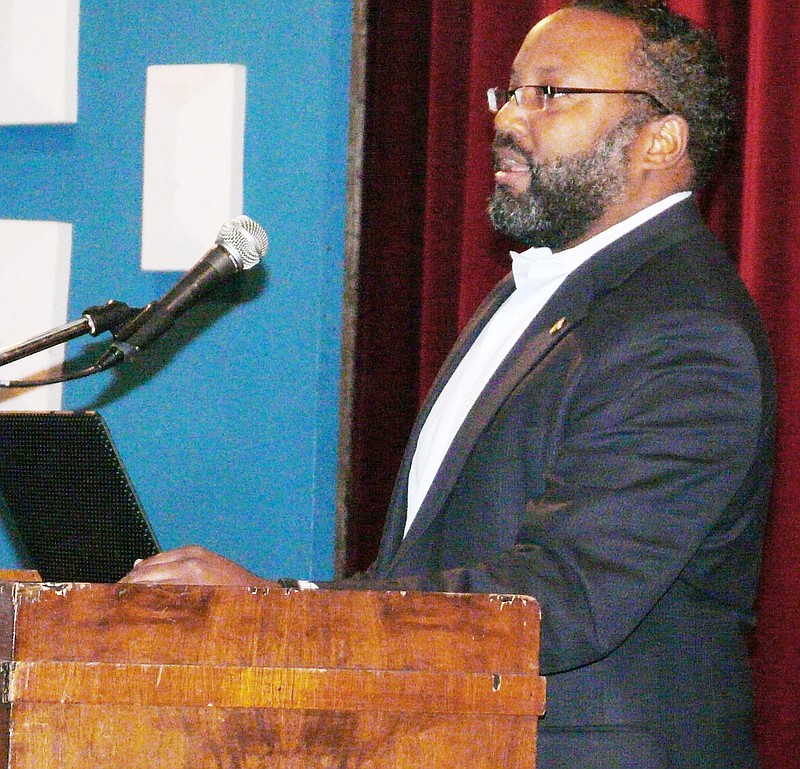The U.S. Constitution may be more important today than when it was written in 1787, Rod Chapel Jr. told Lincoln University students Tuesday.
"The Constitution is probably more useful and alive today, and will need more attention this decade and, maybe, the next, than generations have seen in awhile," Chapel added.
"I hesitate, but I'll say it, even with the civil rights movement, the changes that we are watching occur now could fundamentally shift what it means to be an American,) our ability to participate in society."
Each year, Sept. 17 is set aside as a federal observance remembering the day in 1787 that 39 Americans signed the Constitution, changing the United States from a confederation of individual states to a federal republic.
Chapel, a former state administrative law judge and current president of Jefferson City's branch of the NAACP, reminded the LU students attending the annual Constitution Day observance that the Constitution originally counted classes of men - those who were free, those who were counted as 3/5 of a person for census purposes, and Native Americans who weren't counted at all because "they weren't taxed."
He asked, rhetorically, if that wasn't hypocritical for a young nation to talk about freedom for all, when it limited or prohibited freedom for some.
"The good news is," he said, "the Constitution allows you to do something else later."
The original Constitution set out some grounds allowing slavery in states that wanted it, but allowing taxes to be imposed on that "property."
And that language was "a tacit recognition that the federal government has the ability to control the activities of the states," Chapel said.
After passing a law - the Fugitive Slave Act - that required "free" states to return runaway slaves to their masters, Chapel noted the issue of slaves in a free state was raised again in the Dred Scott case.
Scott remained a slave as his owner moved from one state to another, then sued for his freedom in Missouri "on the grounds that, since slavery was outlawed in a free territory, he had become a free man and once free, always free," Chapel reported. "That argument was roundly rejected by the Missouri Supreme Court - but Scott and his white supporters managed to get the case into federal court."
The U.S. Supreme Court eventually determined, because Scott was a slave, he never had the citizen's right to sue, and the Missouri Compromise of 1820 was unconstitutional, "since Congress could not forbid citizens from taking their property - slaves - into any territory owned by the United States," Chapel said.
After the Civil War, Congress passed the 13th Amendment outlawing slavery, and the 14th Amendment guaranteeing citizenship to "all persons born or naturalized in the United States" and promising the "due process of law" to all.
Still, Chapel told the students, those amendments still affect today's government policies.
For example, the federal courts recently told New York City its "stop and frisk" law violated citizens' constitutional rights.
Chapel said a federal judge noted the policy wasn't based on "reasonable suspicion" that an individual should be stopped, and the city's own statistics showed nearly all of the 4.4 million people who were stopped had no weapons and no contraband of any kind.
Based on population percentages, the court found that twice as many African Americans and only a third of Caucasians were stopped, compared to their population shares.
Similar questions are being raised by Missouri's reporting on traffic stops, Chapel noted, where people often appear to be stopped based on their skin color rather than a major traffic violation.
He also pointed to the number of states, including Missouri, that appear to be trying to control people's access to voting by requiring photo ID cards.
"Nowhere does it say in the Constitution that you have to have a photo ID," he noted. "Missouri, like other states, is treading dangerously close to creating a law that will allow some people to vote and some people not to."
Those are modern issues showing why people need to keep discussing the Constitution, he said, and why Constitution Day is important.
"Today has a special importance to me," Chapel told the students. "Constitution Day is a day I look forward to every year, because it's an opportunity to talk about our core values."
Accompanying photo:

